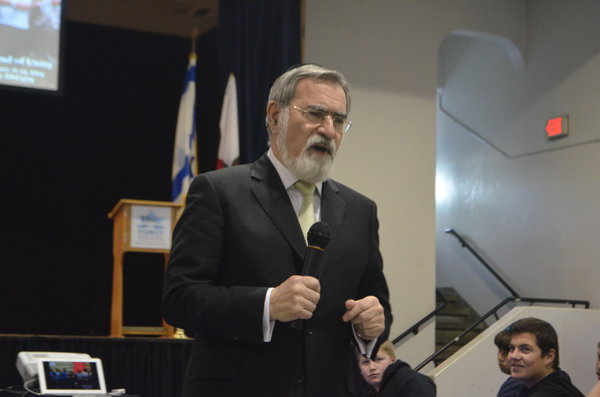Rabbi Lord Jonathan Sacks, ‘master of thought’ and a Rashi of our time, has died at age 71

BP Archive Photo by Goldie Fields ’15
LOCAL: Rabbi Sacks, whose teachings are spread throughout the LaHav curriculum, made many trips to Los Angeles, including to Hillel Hebrew Academy, above, in February 2014.
December 1, 2020
Rabbi Lord Jonathan Sacks, former Chief Rabbi of the United Kingdom, author of more than 30 books, and the one to thank for the introductions and commentary in the Koren Siddurim and Machzorim, passed away from cancer at the age of 72 on Saturday, Nov. 7, in London.
During a school-wide Zoom assembly Nov. 9, teachers shared quotes, stories, and divrei Torah about and from him. Rabbi Abraham Lieberman said the entire Shalhevet community stands on his shoulders.
“We are sometimes blessed with people who literally are in our midst, who are giants, and Rabbi Sacks, Ya’akov Zvi ben David Arieh, was that giant,” said Rabbi Lieberman at the morning event.
“We stand on his shoulders here at Shalhevet,” he continued, “because if you go through his books, what has he done? He’s taught us Jews how to engage the world, how to be proud of who we are.”
Rabbi Sacks was the Chief Rabbi of the United Kingdom from 1991 to 2013. He was a philosopher, speaker, teacher, and author, publishing more than 30 books, along with hundreds of other articles, throughout his lifetime. His most recent book, Judaism’s Life-Changing Ideas: A Weekly Reading of the Jewish Bible, was published just two months ago.
He was awarded a seat in the British House of Lords in 2009. In the British Parliament, the people who make up the House of Commons are elected, whereas the people who make up the House of Lords are awarded a seat because of their accomplishments.
Another honor he received was the 2016 Templeton Prize, an international award given to someone who “harnesses the power of the sciences to explore the deepest questions of the universe and humankind’s place and purpose within it.”
Rabbi Sacks also traveled widely and met with students and communities around the world, including in Los Angeles, where he spoke to area students at Harkham Hillel Hebrew Academy and Young Israel of North Beverly Hills.
At an event in 2014, then-Shalhevet junior Margo Feuer asked Rabbi Sacks whether he thought it was morally acceptable for people in one group to have, by birth, more inherent potential than people from other groups.
According to a Boiling Point story at the time, the rabbi replied that all people have their chosen roles to play within the world.
“Judaism is God’s rejection of empire,” Rabbi Sacks said. “In an empire, everyone is expected to be the same.”
According to Rabbi Leiberman, though he knew halacha very well Rabbi Sacks did not serve as a posek, or someone who makes halachic decisions.
“His job was the ba’al machsheva,” or master of thought, Rabbi Lieberman said at the assembly Nov. 9. “He was the thinker, the philosopher, whose impact, in the long run, is so much greater. Thank God that we live in a generation that got to know him, study him. And here at Shalhevet, how lucky we are that we are able to carry on his legacy.”
Rabbi Sacks’ writings are included all throughout the LaHaV curriculum, the Talmud curriculum published in 2011 that was developed at Shalhevet and is used in cities around the world.
An excerpt from Rabbi Sacks’ Creativity and Innovation in Halakh, about the meaning of “lo ba-shamayim hi” in Deuteronomy, is included in the first chapter of the ninth-grade LaHav curriculum. The phrase expresses the idea that the details of Jewish law and practice should be set by the people and not by God.
The verse, Devarim 30:12, states: “It is not in heaven, that you should say, ‘Who will go up to heaven for us, and get it for us so that we may hear it and observe it?
“Lo ba-shamayim hi is not an intrinsically revolutionary doctrine; if anything, it is a conservative one,” Rabbi Sacks wrote. “It places pesak [decision] firmly in the context of interpretation and consensus.”
Rabbi Lieberman said that Shalhevet is very lucky to have the LaHav curriculum and compared Rabbi Sacks to Rashi, the great medieval commentator, because people are learning Rashi’s commentary every day.
Judaic Studies teacher Rabbi David Stein, who co-wrote the LaHav curriculum, said he included so many of Rabbi Sacks’ writings partly because he was such an important leader and also because he wrote things in a way that is clear yet sophisticated.
“He lived in our world,” Rabbi Stein said in an interview with the Boiling Point, “and the ideas that he had were not just for the smartest people, they weren’t just for the best people. They were for everyone… It’s one of those things that marked his greatness.”
Rabbi Stein, who also is Interim Director of Judaic Studies, said Rabbi Sacks reminded him of a verse from Tehillim (Psalms), No. 119, verse 162: Sas anokhi al im’ratekha, k’motzei rav salal, which means “I rejoice in your promise like one who finds great treasure.”
“‘I’m so happy,’ or ‘I’m so excited for your words,” Rabbi Stein said, “because it’s like finding a treasure. I always feel that way about Rabbi Sacks.
“It’s like, oh my gosh, what a beautiful perspective — that really helps me better understand this story, or this Chumashm or this sugyah, or myself.”
At the Zoom assembly, a 2010 video was shown of Rabbi Sacks describing what it means to be Jewish. In the video, published by the media archive JInsider, Rabbi Sacks says that every person is writing the next chapter — “your individual chapter” — in a book that has been passed down from generation to generation by his or her ancestors.
“If they put their faith in their children to keep the book going, then they have all put their faith in me,” Rabbi Sacks said on the video.
He said these “books” together comprise the story of the Jewish people as whole.
“To be a Jew is to be part of the most remarkable story ever lived by any people.” said Rabbi Sacks, “Covering more countries, more adverse circumstances, more triumphs and tragedies, than any other story. And then the sudden realization that every one of us has their chapter to write in that story and hand the book on.”
Earlier, Dean of Students Rabbi Ari Schwarzberg opened the assembly by saying Rabbi Sacks embodied Shalhevet’s values and beliefs.
“Rabbi Sacks is a guiding light,” Rabbi Schwarzberg said, “a model of the aspirational values that we as teachers try to infuse this school with and try to pass on to you.
“They are deeply accessible words, they are profound words, and I know that they’ve had a small part in shaping your own Jewish identity
He said Rabbi Sacks’ Jewish mission was a mission to the entire world.
“What is the point of religion — what is the point of being a Jew?” Rabbi Schwarzberg said. “It is absolutely to make the world a better place.”
Judaic Studies teacher Dr. Sheila Keiter said being the chief Rabbi meant Rabbi Sacks was supposed to represent all of the Jews living there.
“But the reality of it was…he represented Judaism — not just to England but really to the world,” said Dr. Keiter.
She said Rabbi Sacks was considered “the Queen’s rabbi,” and that Prince Charles would ask him for advice.
“The reason he did this was because the universal truths that Rabbi Sacks stood for were so apparent, his wisdom was so apparent,” said Dr. Keiter. “And that wisdom came from Torah.”
She said that on the Shabbat morning of Princess Diana’s funeral in 1997, Rabbi Sacks stepped out of shul to pay his respects as the funeral procession passed by.
“There he was, representing Judaism and representing kavod habriot — representing that respect for all of humanity,” said Dr. Keiter. “And in my mind, that’s what he represented and continues to represent until this day.”
Rabbi Sacks had been treated twice for cancer earlier in his lifetime–once in his thirties, again in his fifties — before it finally took his life last month.
Judaic Studies teacher Rabbi Yagil Tsaidi told the assembly that Rabbi Sacks was once asked why he did not mention or use his sicknesses in any of his writing, as other rabbis and scholars have done.
According to Rabbi Tsaidi, Rabbi Sacks replied that his father was his role model, and although he did not have much of a Jewish education, he had a very strong belief in Hashem. When his father was in the hospital, he put his trust in God and knew that if it was time for him to pass or if he was still needed in this world, the decision was up to God.
Rabbi Sacks took on this mindset.
“I felt that if Hashem needs me up there, thank you very much for my time down here. I’ve enjoyed every day and feel very blessed. And if he wants me to stay, and there is still work for me to do, then he is going to be part of the refua and I put my trust in him,” Rabbi Sacks continued to answer.
Rabbi David Block, associate head of school, closed the assembly with a way to take action.
“It’s important that one of the ways in which we commemorate someone is to take one of their midot, one of their characteristics,” Rabbi Block said, “and adopt it ourselves and bring it into the world that way. And that way, we keep that person alive.”













